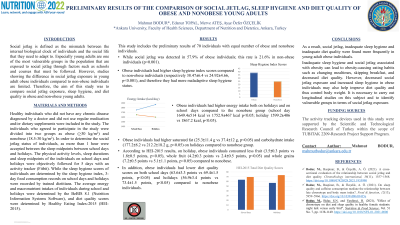Back

Objectives: This study aimed to compare social jetlag exposure, sleep hygiene, and diet quality in obese and nonobese young adults.
Methods: This study was conducted with obese and nonobese young adults. To determine the social jetlag, as more than 1h was accepted between the sleep midpoints between school days and holidays. The physical activity levels and sleep parameters were objectively followed for 5 days with an activity tracker on school days and holidays. The sleep hygiene scores were determined by the sleep hygiene index, 3-day 24-hour dietary recall were recorded on both days. The energy and macronutrient intakes during school and holidays were determined by the software, and diet quality scores were determined by Healthy Eating Index-2015(HEI-2015).
Results: This study includes the preliminary results of 70 individuals (22.06±1.76 years) with an equal number of obese and nonobese individuals. While social jetlag was detected in 57.9% of obese individuals; 21.6% in nonobese individuals (p < 0.001). Obese individuals had more inadequate sleep hygiene status (38.47±6.4 vs 24.92±4.66, p< 0.001). While the difference between the sleep midpoints of obese individuals on school days and holidays were 1:27±00:54 minutes; 00:49±00:32 minutes in nonobese individuals (p < 0.001). Obese individuals had a shorter sleep duration on the school day (-0:42±0:15 min, p< 0.001); on holidays, sleep durations were found to be similar (8:31±1:49 vs 8:14±1.05, p >0.05). Obese individuals had higher energy intake both on holidays and on school days (school day 1649.4±514 vs 1752.9±467 kcal p< 0.05; holiday 1599.2±406 vs 1867.2 kcal, p< 0.05). Obese individuals had higher saturated fat (25.3±11.4g vs 37.4±12g, p< 0.05) and carbohydrate intake (177.2±8.2 vs 212.2±18.2 g, p< 0.05) on holidays. According to HEI-2015, obese individuals had lower diet quality on school days (63.6±3.3 vs 69.4±1.5 points, p< 0.05) and holidays (56.9±3.4 vs 73.4±1.5 points, p< 0.05).
Conclusions: As a result, decreased social jetlag exposure and increased sleep hygiene in obese individuals also help improving diet quality and thus may help controlling of body weight. It is necessary to conduct longitudinal studies and to identify vulnerable groups in terms of social jetlag exposure.
Funding Sources: This study was supported by the TUBITAK 2209-Research Project Support Programme for Undergraduate Students.
Eating Frequency and Chrononutrition
(PO09-03-22) Preliminary Results of the Comparison of Social Jetlag, Sleep Hygiene and Diet Quality of Obese and Nonobese Young Adults


Mahmut Bodur
– PhD Student, Ankara University, Ankara, Ankara, Turkey- ET
Edanur Topal
– Ankara University - MA
Merve Ateş
– Ankara University - A�
Ayşe Özfer Özcelik
– Ankara University
Presenting Author(s)
Co-Author(s)
Disclosure(s):
Mahmut Bodur: No relevant financial relationship(s) with ineligible companies to disclose.
Objectives: This study aimed to compare social jetlag exposure, sleep hygiene, and diet quality in obese and nonobese young adults.
Methods: This study was conducted with obese and nonobese young adults. To determine the social jetlag, as more than 1h was accepted between the sleep midpoints between school days and holidays. The physical activity levels and sleep parameters were objectively followed for 5 days with an activity tracker on school days and holidays. The sleep hygiene scores were determined by the sleep hygiene index, 3-day 24-hour dietary recall were recorded on both days. The energy and macronutrient intakes during school and holidays were determined by the software, and diet quality scores were determined by Healthy Eating Index-2015(HEI-2015).
Results: This study includes the preliminary results of 70 individuals (22.06±1.76 years) with an equal number of obese and nonobese individuals. While social jetlag was detected in 57.9% of obese individuals; 21.6% in nonobese individuals (p < 0.001). Obese individuals had more inadequate sleep hygiene status (38.47±6.4 vs 24.92±4.66, p< 0.001). While the difference between the sleep midpoints of obese individuals on school days and holidays were 1:27±00:54 minutes; 00:49±00:32 minutes in nonobese individuals (p < 0.001). Obese individuals had a shorter sleep duration on the school day (-0:42±0:15 min, p< 0.001); on holidays, sleep durations were found to be similar (8:31±1:49 vs 8:14±1.05, p >0.05). Obese individuals had higher energy intake both on holidays and on school days (school day 1649.4±514 vs 1752.9±467 kcal p< 0.05; holiday 1599.2±406 vs 1867.2 kcal, p< 0.05). Obese individuals had higher saturated fat (25.3±11.4g vs 37.4±12g, p< 0.05) and carbohydrate intake (177.2±8.2 vs 212.2±18.2 g, p< 0.05) on holidays. According to HEI-2015, obese individuals had lower diet quality on school days (63.6±3.3 vs 69.4±1.5 points, p< 0.05) and holidays (56.9±3.4 vs 73.4±1.5 points, p< 0.05).
Conclusions: As a result, decreased social jetlag exposure and increased sleep hygiene in obese individuals also help improving diet quality and thus may help controlling of body weight. It is necessary to conduct longitudinal studies and to identify vulnerable groups in terms of social jetlag exposure.
Funding Sources: This study was supported by the TUBITAK 2209-Research Project Support Programme for Undergraduate Students.

.png)

